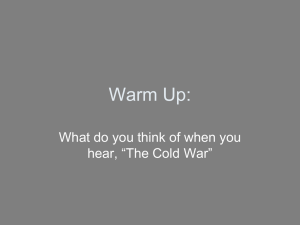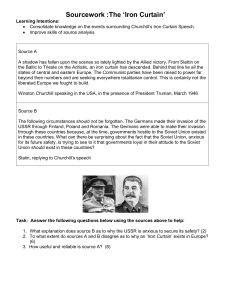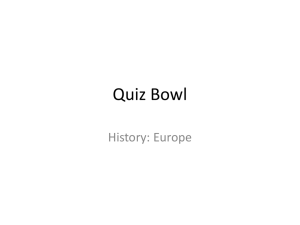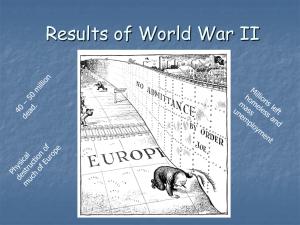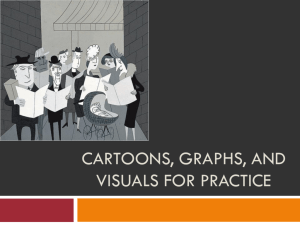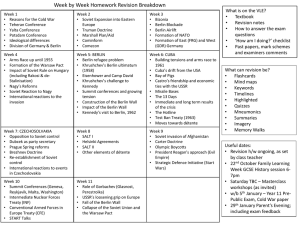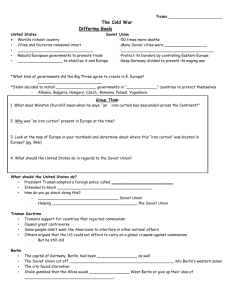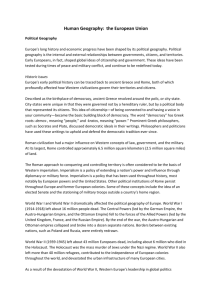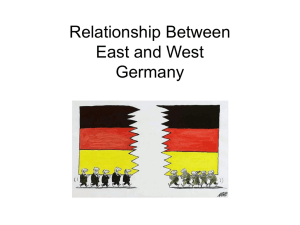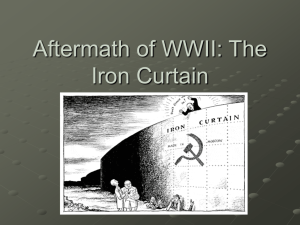BERLIN WALL 2.0 - Mr. Krus World Geography
advertisement
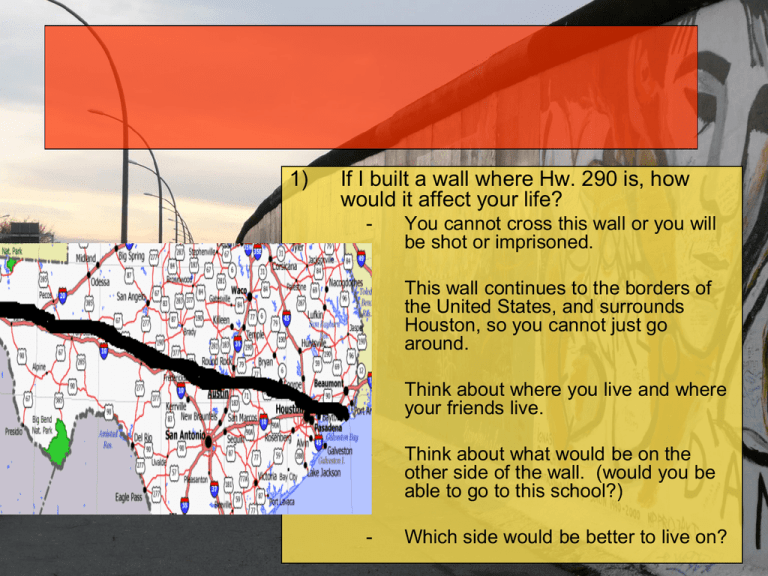
1) If I built a wall where Hw. 290 is, how would it affect your life? - You cannot cross this wall or you will be shot or imprisoned. - This wall continues to the borders of the United States, and surrounds Houston, so you cannot just go around. - Think about where you live and where your friends live. - Think about what would be on the other side of the wall. (would you be able to go to this school?) - Which side would be better to live on? The Berlin Wall and the fall of the Soviet Union Cy-Woods HS World Geography ’13-’14 Where are we talking about? Berlin, Germany Why was there a wall there? Let’s go back to the end of World War II (1945). The aftermath of World War II • What was left of Nazi Germany was divided into 4 areas. • Britain, France, US, and Soviet Union • Berlin (the capital) was also split into 4, even though it was mostly inside the Soviet zone. The aftermath of World War II • Two big powers arose (United States and the Soviet Union). • Eastern Europe became dominated by the USSR. • An “iron curtain” was formed. “Iron Curtain” • “From Stettin in the Baltic to Trieste in the Adriatic, an iron curtain has descended across the Continent.” -Churchill • http://www.youtube.com/ watch?v=S2PUIQpAEAQ • NOT a physical wall. • The “iron curtain” was an ideological divide between Western democracy and Soviet communism. The onset of the Cold War • In 1949, as the Cold War between the US and the Soviet Union was heating up, Germany split. • Federal Republic of Germany (France, Britain, US) including West Berlin • German Democratic Republic (Soviet Union) including East Berlin West Germany (FRG) West Germany Market economy; capitalist Democratic parliamentary government High standard of living East Germany (GDR) East Germany Command economy; communist Authoritarian government Low standard of living Which side built the wall and why? • The Soviets decided to build the wall in 1961. • They wanted to prevent people from leaving East Germany. • Why would people want to go from East Germany to West Germany? What were the effects of the Berlin Wall? • Families were separated. • People could not get to their jobs. • While East Germany grew economically, it was viewed as oppressive by the world. Why didn’t they just go around the wall? Did anyone try to escape? • There were 5,000+ escapes. • 136 confirmed dead. "Do not hesitate to use your firearm, not even when the border is breached in the company of women and children, which is a tactic the traitors have often used" • Most escapes were early in the wall’s existence. Fall of the Berlin Wall • People were going through Czechoslovakia and mass protests in East Germany were beginning. • November 9th, 1989 • People were allowed travel between the two. http://www.youtube.com/watch?v=YtYdjbpBk6A celebration The Aftermath • Germany had begun reunification. • This marked the fall of communism. See Berlin Wall clip The Aftermath • Problems arose with reunification: • East was communist (inefficient). • West was capitalist. • Closing factories in the East would cost thousands of jobs. Eventually, the Soviet Union would collapse altogether. The Aftermath • West Germany • East Germany • They would have to pay for reunification ($40,000/person). • Factories would have to close, leaving thousands jobless. • There would be a mass migration of East Germans into the West looking for jobs. • Women had to give up free child care to go to work. • The government no longer guaranteed jobs. • The government no longer offered free housing. • East German money was worthless. • • East Germans would work for less than West Germans. They would not have enough natural resources and would have to import them. Why reunite then? • The German “people” would be linked together in a single country. • Families separated since 1945 would be reunited. • Potential for the future. Your assignment • On a piece of notebook paper, write a letter to a friend on the other side of the wall. • East (middle row, pick one) West • Tell them: – What life is like on your side of the wall. – What you have heard about life on their side of the wall.
